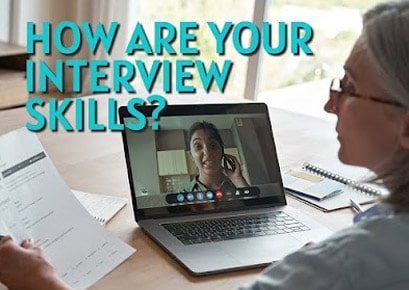NO JOB OFFER?
A Must-Read For The Job Seeker
![]()
NOT GETTING AN OFFER? IS IT YOUR RESUME… OR YOUR INTERVIEW SKILLS?
Searching for a new job can be frustrating, especially when you hear the market is hot, but no luck in landing one.
Top two reasons why this may be the case:
RESUME:
If you fill out job applications and submit your resume, but don’t get invited for an interview… Look no further than your resume.
HR goes through resumes online. Having the RIGHT KEYWORDS present is an absolute must. Most HR Managers and Recruiters receive hundreds of resumes. They don’t have time to open each one; instead, they do a keyword search for a specific title (e.g. Director of Marketing) or skill (e.g. Javascript). If that keyword is absent from your resume… It won’t even have been opened.
INTERVIEW SKILLS:
If you are getting many interview invitations, you know your resume works; but if you’re not getting called back and you receive no offer, your interview skills may need improvement.
So, what’s the issue?
![]()
YOU KNOW YOU HAVE A GREAT RESUME WHEN…
When it comes to the CV or resume, there are many chefs in the kitchen telling you what to put in it and how.
Here are key elements all job search experts would agree must be in a resume.
(1) Does it paint a full chronological picture of your career, from college graduation to present?
If your career spans more than 15 years, the last 10 will suffice, though I recommend elaborating in detail on the last decade, and include a brief overview of the years prior (i.e. company, title, dates).
For those of you with longer careers who are concerned about age discrimination, don’t hide previous job history: age is a protected class.
Employers care most to know that they are investing in you with a view you will be a good long-term fit, at least 3-5 years. If you are concerned about this, include at the top that you are looking to work “x” more years to reassure the employer.
(2) Does it include tangible accomplishments & achievements?
Don’t just state you managed a team. Instead, state “I managed a team of 10, including 5 finance managers, 4 accounting managers, and 1 executive assistant.”
Don’t just state you managed P&L. State: “I oversaw the company’s largest and most successful division, with $100M in P&L oversight and 350 employees.”
Make it real!
Do you work in Sales? Highlight as many numbers as you can: Presidents’ Club awards, exceeding quotas, revenue generated for the company…
MORE ABOUT GREAT Resumes…
So, we covered the need for your resume to flesh out your entire work history with tangible successes that speak to the HR pros and recruiters you plan to meet.
There are 2 more features your resume must have.
(3) Explain any gaps or short stays in employment
Don’t hide them as recruiters and employers look for this.
If you have one or more of these on your resume, be sure to add a bullet explaining why you only worked for that company less than one year or why you took 2 years off.
Hiring managers are understanding and will be fine with this in most cases, much more so than finding out later that you were hiding it.
(4) Make your resume easy to read
Provide a brief summary (a few sentences max) followed by concise bullet points. This way, HR pros and recruiters can easily glance over your resume and find the information they are looking for. Long paragraphs are seldom read.
Are Your Interview Skills Strong Enough?
Tired of hearing “Thank you for your interest and for your time in our process, but we are moving forward with another candidate”? Or: “It was between you and one other candidate, and we decided they were a better fit”? Or any other variation thereof?
Here is some advice that will help:
(1) Do they like you?
Regardless of what job you are applying for, you must think of yourself as a salesperson, and in this case the product is You. As with any sale, BEFORE the customer (your prospective employer) can be interested in hearing about your offer, they first need to LIKE you.
The more you can relax, let your personality shine, and focus on establishing rapport with the interviewer… the easier the interview will go, and the more likely you are to stand out from your competition.
(2) Show them you MATCH the job description
The job description is a cheat sheet before the big test (the interview); study it well and be prepared to HIGHLIGHT, with good supporting stories and examples, the parts of your background that illustrate you have the skills and experiences they want.
“Tell me about yourself” is NOT an invitation to tell the interviewer your life story. They don’t care. Their concern is to hear what parts of your story MATCH the job description.
CAN YOU CLOSE THE DEAL DURING Your Interview?
Most candidates finish their interview in a mystery… much like at the end of a first date, wondering if the interviewer liked them, and eagerly awaiting a call-back for a 2nd interview.
This is the third piece of advice we’d like to share:
(3) Show initiative & CLOSE the deal
Take the mystery out of the equation, and impress them with an extra step competing candidates don’t often do: ask for next steps and for the job.
Tell your interviewer you are very interested and you would like to move forward.
Do so then and there, and in the form of a follow-up email.
If the interviewer gives you a “We’ll get back to you” answer, continue to follow-up weekly by phone or email to keep your name top of mind.
WE CAN HELP
Are you currently considering searching for a new executive position? Contact us.
Are you an employer? If you don’t have time managing the interview process to fill a key role, call us.


